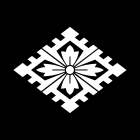Ōuchi clan
| Ōuchi clan 大内氏 | |
|---|---|
|
The emblem (mon) of the Ōuchi clan | |
| Home province | Suō |
| Titles | Various |
| Final ruler | Ōuchi Yoshinaga |
| Dissolution | 1557 |
| Ruled until | 1557, Ōuchi Yoshinaga commits seppuku |
Ōuchi clan (大内氏 Ōuchi-shi) was one of the most powerful and important families in Japan during the reign of the Ashikaga shogunate in the 12th to 14th centuries. Their domains, ruled from the castle town of Yamaguchi, comprised six provinces at their height, and the Ōuchi played a major role in supporting the Ashikaga in the Nanboku-cho Wars against the Imperial Court. The Ōuchi remained powerful up until the 1560s, when they became eclipsed by their vassals, the Mōri clan.
Based in Suō Province, towards the western end of Honshū, the Ōuchi were among the primary families to be involved in foreign trade and relations, particularly with China. Following the Ōnin War (1467–1477), a strong rivalry developed between the Ōuchi and the Hosokawa family, who were now in power. The two clashed at Ningbo in 1523, and as a result the Chinese closed Ningbo to Japanese traders. By the time the Ōuchi were again allowed to send a ship a few years later, the trade was dying out. The family's trade with China fully came to an end by 1548, their monopoly broken by merchants from the seaport of Sakai. The Ōuchi also housed the Portuguese Jesuit missionary Francis Xavier for a time in 1551.
As a result of their wealth and trading contacts, the Ōuchi gained renown in the worlds of art and culture as well. They possessed countless items of cultural and artistic significance and beauty, from Japan and China, as well as from further abroad. Particularly famous was the invitation by Ōuchi Masahiro of the famous painter Sesshū to Yamaguchi in 1486. The prosperity of the Ōuchi was such that they attempted to bring the Emperor Go-Nara to move his capital from the war-torn Kyoto to their home city Yamaguchi in 1551, but the backlash against this plan by the Ōuchi's military establishment caused a rebellion which forced the daimyo Ōuchi Yoshitaka to commit suicide.[1] The Ōuchi line proper ended here — for the next (and last) clan head Ōuchi Yoshinaga, installed by the leader of the rebellion Sue Harutaka, was actually the younger brother of the Ōuchi rival Ōtomo Sōrin. Yoshinaga committed suicide two years after the Battle of Miyajima of 1555 in which Sue Harutaka was defeated by Mōri Motonari, another former vassal of Yoshitaka.
Significant members of the Ōuchi family
- Ōuchi Yoshihiro (1356–1400) – Led a revolt against Shogun Ashikaga Yoshimitsu.
- Ōuchi Masahiro – one of Yamana Sōzen's chief generals in the Ōnin War.
- Ōuchi Yoshioki (1477–1528) – Restored the shogun Ashikaga Yoshitane to power after a fifteen-year absence in 1508.
- Ōuchi Yoshitaka (1507–1551) – One of the first Ōuchi lords to see (and perhaps cause) the decline of the family.
- Ōuchi Yoshinaga (d. 1557) – The last Ōuchi lord, he was the son of Sengoku daimyo, Ōtomo Yoshiaki.
Popular Culture
Ouchi is a playable nation in the grand strategy game Europa Universalis IV.
Ouchi is also a non-playable AI faction in Shogun 2: Total War.
Notes
- ↑ Conlan, Thomas (2015). "The Failed Attempt to Move the Emperor to Yamaguchi and the Fall of the Ōuchi". Japanese Studies. 35 (2): 194. doi:10.1080/10371397.2015.1077679. Retrieved 6 March 2016.
References
- Sansom, George (1961). A History of Japan: 1334–1615." Stanford: Stanford University Press.
- Sansom, George Bailey (1962). "Japan: A short cultural history." New York: Appleton-Century-Crofts, Inc.
- Turnbull, Stephen (1998). The Samurai Sourcebook. London: Cassell & Co.
